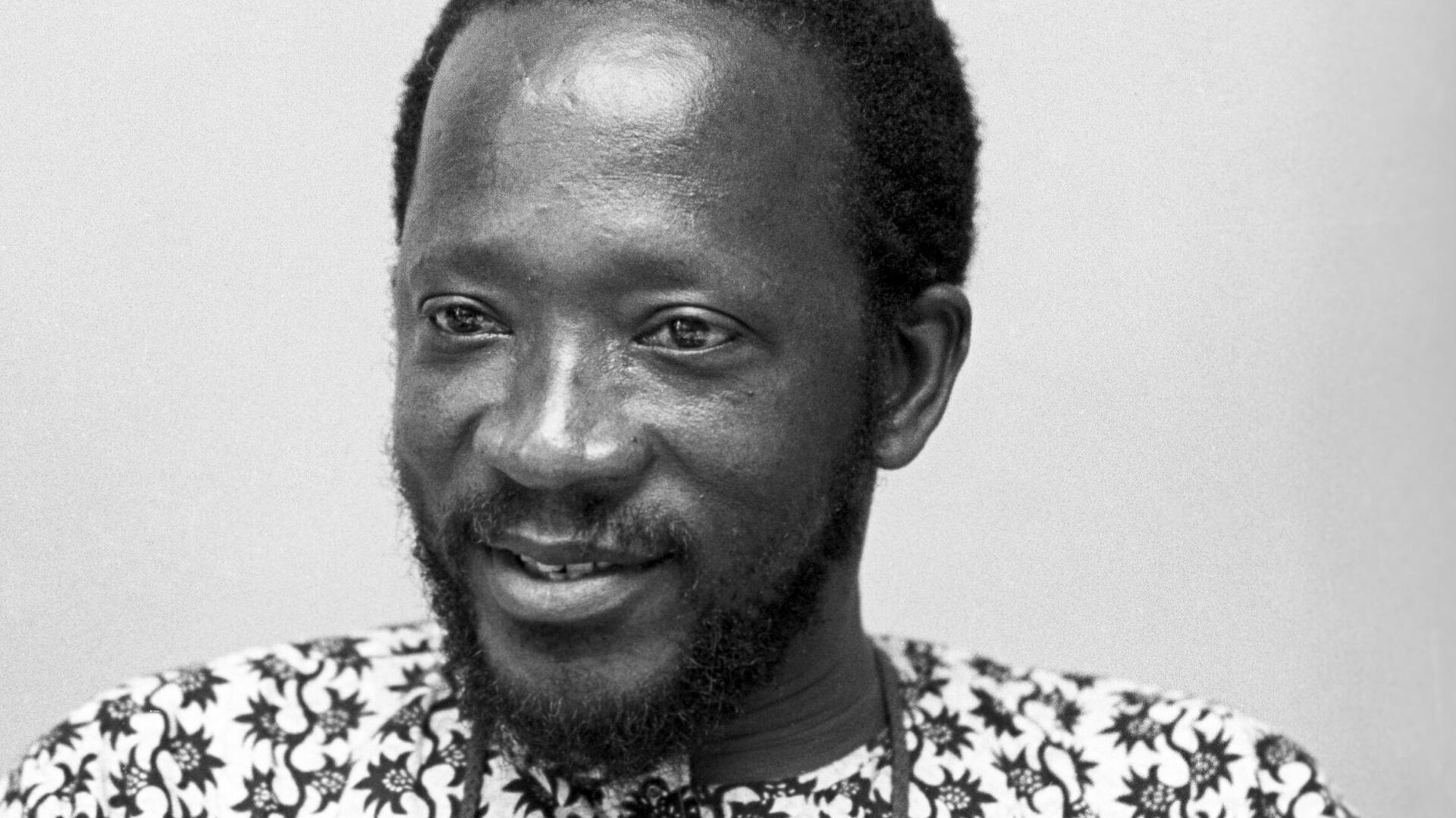https://en.sputniknews.africa/20240101/ousmane-sembene-cinematic-pioneer-and-advocate-for-african-realities-1064416075.html
Ousmane Sembene: Cinematic Pioneer and Advocate of African Realities
Ousmane Sembene: Cinematic Pioneer and Advocate of African Realities
Sputnik Africa
January 1 would have been the 101st birthday of Senegalese director Ousmane Sembene, who is considered the founder of the continent's cinema. Sputnik Africa... 01.01.2024, Sputnik Africa
2024-01-01T17:03+0100
2024-01-01T17:03+0100
2024-01-01T17:16+0100
opinion
cinematography
soviet union (ussr)
france
senegal
west africa
culture
history
africa in details
https://cdn1.img.sputniknews.africa/img/07e8/01/01/1064418222_0:370:2327:1678_1920x0_80_0_0_7d003ed7c67e7c3719d23ceb16900f4e.jpg
Ousmane Sembene earned the nickname "father of African cinema" for being the first sub-Saharan African to make films in the continent, Professor at the Faculty of Letters and Humanities of Cheikh Anta Diop University and filmmaker Magaye Kasse, told Sputnik Africa.Before him, Paulin Soumanou Vieyra had directed short film "Afrique-sur-Seine" in France as "colonization prohibited filmmakers, even beginners, from shooting films in the metropolis," Kasse revealed. However, Sembene broke these barriers and commenced his cinematic journey with "Borom Sarret" in 1962, winning accolades at the Tours Festival in 1964.Sembene's filmography extends from "Borom Sarret" to his final work, "Moolaade" in 2004. Throughout this prolific career, he addressed pressing issues facing African nations, including governance, post-independence challenges, corruption, and the struggles of women and youth, the professor added.Magaye Kasse pointed out that colonialism was one of the themes Sembene dealt with in his work. For example, the dramatic 1964 short "Niaye," which tells the story of a soldier who returns from war mad, is "the trial of colonization," Kasse believes.Another example given by Kasse is Sembene's unfinished documentary "L' Empire songhai", which is "a denunciation of the negation of the vitality of African empires."According to the director, the themes addressed by Sembene in his films remain relevant in contemporary Africa.Another fact from Sembene's biography is that he did an internship in the Soviet Union in 1962, where he learned directing from such Soviet film icons as Mark Donskoy.Kasse noted that studying in Moscow influenced the Senegalese director's ideological commitment during the Cold War, a confrontation between "the imperialist camp led by the United States and European countries such as France and England, on the one hand, and the progressive movement supported by the Soviet Union and the countries of Eastern Europe, on the other."Ousmane Sembene died on June 9, 2007 at his home in Dakar, leaving behind three sons from two marriages and 12 works of cinema.
https://en.sputniknews.africa/20230825/black-to-the-ussr-documentary-celebrates-russia-africa-cultural-bond-on-final-day-of-brics-summit-1061626660.html
soviet union (ussr)
france
senegal
west africa
Sputnik Africa
feedback@sputniknews.com
+74956456601
MIA „Rossiya Segodnya“
2024
Maxim Grishenkin
https://cdn1.img.sputniknews.africa/img/07e7/0a/17/1063018107_0:0:1104:1103_100x100_80_0_0_03090c85a11f5d2e8a19cf1d989443c9.jpg
Maxim Grishenkin
https://cdn1.img.sputniknews.africa/img/07e7/0a/17/1063018107_0:0:1104:1103_100x100_80_0_0_03090c85a11f5d2e8a19cf1d989443c9.jpg
News
en_EN
Sputnik Africa
feedback@sputniknews.com
+74956456601
MIA „Rossiya Segodnya“
Sputnik Africa
feedback@sputniknews.com
+74956456601
MIA „Rossiya Segodnya“
Maxim Grishenkin
https://cdn1.img.sputniknews.africa/img/07e7/0a/17/1063018107_0:0:1104:1103_100x100_80_0_0_03090c85a11f5d2e8a19cf1d989443c9.jpg
cinematography, soviet union (ussr), france, senegal, west africa, culture, history, africa in details
cinematography, soviet union (ussr), france, senegal, west africa, culture, history, africa in details
Ousmane Sembene: Cinematic Pioneer and Advocate of African Realities
17:03 01.01.2024 (Updated: 17:16 01.01.2024) January 1 would have been the 101st birthday of Senegalese director Ousmane Sembene, who is considered the founder of the continent's cinema. Sputnik Africa reached out to a professor and expert on Sembene's work to speculate on the Senegalese's contribution to African culture.
Ousmane Sembene earned the nickname "father of African cinema" for being the first sub-Saharan African to make films in the continent, Professor at the Faculty of Letters and Humanities of Cheikh Anta Diop University and filmmaker Magaye Kasse, told Sputnik Africa.
Before him, Paulin Soumanou Vieyra had directed short film "Afrique-sur-Seine" in France as "colonization prohibited filmmakers, even beginners, from shooting films in the metropolis," Kasse revealed. However, Sembene broke these barriers and commenced his cinematic journey with "Borom Sarret" in 1962, winning accolades at the Tours Festival in 1964.
"And so he left his mark, that is to say, his cinematographic technique, the technical processes he used, the camerawork, the theme he developed, the interest that it aroused, the problems that his cinema addressed and which was a cinema that was both hotly topical for the time, that is to say dealing with the problems that Africa was facing," Kasse said.
Sembene's filmography extends from "Borom Sarret" to his final work, "Moolaade" in 2004. Throughout this prolific career, he addressed pressing issues facing African nations, including governance, post-independence challenges, corruption, and the struggles of women and youth, the professor added.
Magaye Kasse pointed out that colonialism was one of the themes
Sembene dealt with in his work. For example, the dramatic 1964 short "Niaye," which tells the story of a soldier who returns from war mad, is "the trial of colonization," Kasse believes.
"And so it's also a denunciation of the harmful effects of colonization on Africa's involvement in the First World War, a war that was far from the African continent and that was a war between imperialist powers, because the First World War was not a people's war [...]," he opined.
Another example given by Kasse is Sembene's unfinished documentary "L' Empire songhai", which is "a denunciation of the negation of the vitality of African empires."
According to the director, the themes addressed by Sembene in his films remain relevant in contemporary Africa.
"The same evils are afflicting African societies and will continue to do so unless Africans themselves rise up to put an end to this form of government, which is in no way that of the working masses," Kasse opined.
Another fact from Sembene's biography is that he did an internship in the
Soviet Union in 1962, where he learned directing from such Soviet film icons as Mark Donskoy.
Kasse noted that studying in Moscow influenced the Senegalese director's ideological commitment during the Cold War, a confrontation between "the imperialist camp led by the United States and European countries such as France and England, on the one hand, and the progressive movement supported by the Soviet Union and the countries of Eastern Europe, on the other."
At that time, the filmmaker was learning how to make movies "an instrument of protest, but also of contention, to raise awareness, first of all, of development issues, and then of the impasses in which African countries found themselves, impasses that were the result of the unwillingness of the colonizing countries to allow the colonized countries to achieve independence," the professor revealed.
Ousmane Sembene
died on June 9, 2007 at his home in Dakar, leaving behind three sons from two marriages and 12 works of cinema.



